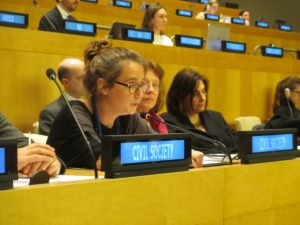
Special high-level meeting of ECOSOC with the World Bank, IMF, WTO and UNCTAD
ECOSOC Chamber, 14-15 April 2014
Statement by Nicole Bidegain Ponte, Development Alternatives with Women for a New Era (DAWN) for thematic debate on theme 2: “Mobilization of financial resources and their effective use for sustainable development
Thanks chair for organizing this interesting debate and the panelists for your inputs.
In the last weeks we have been hearing the “private” sector but specially the “corporate” sector as “development actor” that should be a key driver in the implementation of the SDG. However, it is difficult to conceive that the same actors and the same rules that contributed to a great extent to current global problems such as a the financialization of the economy, unsustainable patterns of production and consumption, or using gender wage inequality as incentive for attracting FDI, will be able not only to “don’t harm”, but furthermore, to “lead in” the sustainable development goals in the long term.
As feminist and civil society groups that are following FfD and the Post2015 , we have been saying that:
1. Fostering mobilization of private resources for sustainable development can’t replace nor downplay the role of states in mobilizing maximum available resources at national and global level to guarantee human rights and environmental sustainability. In the end, states bear primary responsibility for international cooperation to achieve human rights. So, the State driven nature of the Global Partnership for Development should be reaffirmed.
2. Only after addressing systemic issues and putting in place strong accountability mechanisms and criteria to monitor if and how private sector contribute to sustainable development and human rights, we will be able to talk about their role in this agenda.
As we discussed last week in Helsinki, much more regulation at the global and national level is needed in order to orient private sector to sustainable development and human rights. In this sense, I would like to strengthen two proposals:
a. In the first place, REBALANCING THE RULES: Review investment protection treaties and Free Trade Agreements signed by countries which erodes national laws and policy space to fulfill their obligations regarding human rights and environmental sustainability; including women’s access to quality education, healthcare including access to medicines and sexual and reproductive health services, to safe and accessible drinking water; and to sustainable and affordable energy sources. So, trade and investment policies should be subject to ex ante and ex postfacto gender, human rights and environmental impact assessments.
b. Secondly, ADDRESSING THE ACCOUNTABILITY GAP: Adopt a mechanism for global cooperation to reverse the “race to the bottom” which is based on lowering of taxes, human rights, environmental and labour standards to attract FDI. FDI should have performance requirements in order to create decent work, by eliminating the gender pay gap, provide technology transfer and skills, promote links with small and medium enterprises and foster territorial decentralization.
i. This mechanism should include a binding multilateral instrument to hold transnational corporations accountable, preventing and protecting people against human rights abuses perpetrated by private actors. This instrument should assure affected people and communities to have a right to effective remedy.
ii. It should also set clear criteria for eligibility as well as dismissal for any partnership relationship between government and the private sector. Some criteria that should be taken into consideration are the following:
- whether the private actor has a history or current status of serious allegations of abusing human rights or the environment, including in their cross-border activities;
- whether the private actor has a proven track record (or the potential to) deliver on sustainable development, as articulated by the UN outcome by 2015;
- whether the private actor has previous involvement in acts of corruption with government officials;
- whether the private actor is fully transparent in its financial reporting and fully respecting existing tax responsibilities in all countries it operates, and not undermining sustainable development through tax avoidance;
- any conflicts of interest in order to eliminate potential private donors whose activities are antithetical or contradictory to the UN Charter, the Universal Declaration on Human Rights, and the SDG framework.
Thank you very much.
